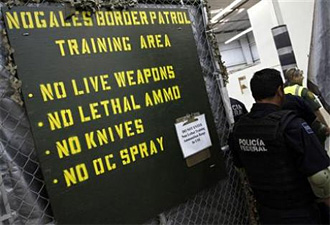
|  |  |  Americas & Beyond Americas & Beyond  
U.S. Border Police Train Mexicans for Drug Fight
 Tim Gaynor - Reuters Tim Gaynor - Reuters
go to original
April 24, 2010


| | BOXTEXT |  |
Nogales, Arizona - In a warehouse in this Arizona border city, a U.S. Border Patrol trainer teaches a Mexican federal policeman to slip into a boxing stance and press a military assault rifle to his shoulder.

Taking aim at a silhouette just a few paces away, the policeman lets off a rapid burst of practice fire in an exercise designed to recreate the urban drug war raging just across the border in Mexico.

"They're getting into close-quarter combat all the time with the drug smugglers and the cartels," Border Patrol instructor Tom Pittman said during a break from training a group of nine Mexican federal agents on Friday.

"We're hoping this will help them prevail, to win, to stay alive," he added.

Since taking office last year, U.S. President Barack Obama has pledged increased support for his Mexican counterpart, Felipe Calderon, in fighting drug cartels that have killed some 22,800 people south of the border since Calderon took office in December 2006.

Mexican authorities along the nearly 2,000-mile (3,200-km) border face lethal fire from well-armed cartels battling for lucrative cocaine, heroin, marijuana and amphetamine smuggling routes to U.S. markets. Mexican police and soldiers are frequent targets of the drug gangs.

On Friday, suspected cartel gunmen shot and killed six police officers and a 17-year-old civilian in a street ambush in Ciudad Juarez, Mexico's most violent city, which is across the border from El Paso, Texas.

U.S. officials are increasingly concerned the violence may take hold in U.S. border communities.

"It's a collaborative effort to make both sides of the border safer," Mark Qualia, a spokesman for the Border Patrol in Washington, said of the program, funded under Plan Merida, the $1.4 billion U.S. program started in 2007 to help Mexico fight the cartels.

"It's a win-win for both countries."

The training program is part of a pioneering effort allowing Border Patrol agents to pass on skills gained from policing the Arizona border corridor - the principal drug and immigrant smuggling route between the two countries - to carefully vetted Mexican federal police.

Since it started earlier this year, Border Patrol agents have trained 48 federal police officers assigned to battle drug traffickers and human smugglers in hot spots along the border. When the group now being trained graduates next week, the total will be 57.

Aside from teaching police to enter buildings and fire assault rifles, the twice-monthly courses give first-aid training, teach patrolling in all-terrain vehicles and share tips for finding hidden vehicle compartments used to smuggle drugs north over the U.S. border, and illicit guns and bulk cash heading south to Mexico.

OVERCOMING FEAR

So far this year, according to news reports, more than 90 people have been murdered in neighboring Nogales, Mexico, including the deputy chief of police who was gunned down by suspected traffickers in March, along with his bodyguard.

"The fear is always there, and you have to know how to control it," said one Mexican federal police officer, speaking on condition of anonymity during a break from weapons training on Friday.

That helps "get you used to the gunfire ... and it gives you confidence," added the officer, dressed in a black uniform and flak jacket, who learned to fire a training version of an M-4 assault rifle.

The training program has also led to benefits for U.S. Border Patrol agents in Nogales, Arizona.

They say they get a swift response when they reach out for assistance from colleagues in Mexico to respond to incidents such as Mexican smugglers hurling rocks across the line at U.S. agents.

"It helps putting a face to the uniform," said Border Patrol agent David Jimarez, who noted assaults on U.S. agents had dropped by two-thirds to an average of three a week since the program started.

"We all belong to the same brotherhood."

(Additional reporting by Julian Cardona in Ciudad Juarez, editing by Peter Cooney)
|

 |
|  |



